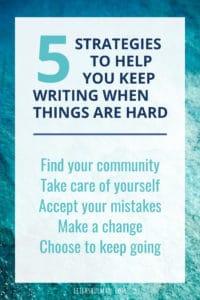How do you write when things are hard?
There are so many things that can get in the way of your writing. Living in post-pandemic times is stressful. Our lives transformed overnight. We have yet to understand the full impact of these drastic life changes, and shifting focus distracts us from writing and doing our work.
Other times, writing seems insurmountable because of where you are in the writing process. The middle of a project, in particular, is a slog.
 You’ve passed the excitement of starting something new but you’re not yet close enough to the end to feel a sense of mastery. Instead, you trudge through the motions, wondering if what you’re doing is working and whether or not you should quit.
You’ve passed the excitement of starting something new but you’re not yet close enough to the end to feel a sense of mastery. Instead, you trudge through the motions, wondering if what you’re doing is working and whether or not you should quit.
And some days are just tiring. The news overwhelms with stories of illness and politics. Civil unrest spreads. It’s painful to watch and impossible to ignore.
But your ideas and your stories make a difference. Whether you’re writing a book that transports your reader to another world or you’re writing political commentary to support Black Lives Matters, profiling Chef Jose Andrés and his work feeding people in Puerto Rico, or reporting the news to keep others informed, your work matters.
Let’s talk about how you can find ways to write even when you’re hitting a wall.
Find your community
The people with whom you spend the most time in your life determine what you see, how you feel, and the choices you make. You feel fear when the people around you are afraid. You can catch happiness. Or bond over your mutual dislike of Nickelback.
It follows naturally that the people around you shape your attitudes to your work. They change your emotional state and shift the way you perceive yourself. Other people’s input can push you toward your goals. They can also slow you down.
When you surround yourself with people you trust, you can turn to them for advice when writing feels like too much. They can help you brainstorm new ways to write and find your way through the complications.
Stay accountable ESPECIALLY when writing is hard
At the beginning of each week in The Workshop, my exclusive online writing community, we begin the week by letting each other know our plans. At the end of the week, I follow up by asking everyone to share what they’ve accomplished and celebrate the work they’ve done.
I include this exercise because it’s a powerful research-based tool to keep you moving forward no matter how complicated life gets.
According to the American Society of Training and Development (ASTD), when you share your plans with other people you’re 65% more likely to reach your goal. When you meet regularly to discuss your progress, you’re 95% more likely to make your goal happen.
It’s easy to show up at the end of the week to let people know you’ve accomplished everything on your list. It’s much harder to announce to a group of your peers that you didn’t meet your goals. You’re likely to berate yourself or feel like a failure. That’s why so many people prefer not to show up and be accountable .
.
When you take responsibility for not creating what you’d hoped, you open a pathway to keep going. When you’re honest about what you haven’t done you can figure out why you didn’t finish and then choose to do differently moving forward. Sometimes that means pushing yourself to do more. Sometimes, you realize the goals you set weren’t realistic. Whatever you decide, you can then rework your plan and right your course. When you take the time to examine your actions, you keep yourself from stagnating and repeating the same mistakes.
Take care of yourself
When I’m busy, I have a tendency to work without stopping, I forget to eat, and I don’t sleep enough. If I allow this to go too long, I start to feel stressed out and my work suffers. Not only that, but I begin to second guess my work. But when I stop to take care of myself and make sure I’m properly rested and nourished, suddenly, my work becomes lighter. I reach my goals faster and I enjoy the process more.
It makes sense, too. How can you do your best work if you’re exhausted? And how can you enjoy your work if you’re forced to push through not feeling well—is mentally, emotionally or physically? Instead, take time to assess your needs and then meet them accordingly.
Change something.
The best parenting advice I ever got was this: Try something. If it doesn’t work, try something else. The same applies to your writing.
If you’re finding it hard to write, then change what you’re doing. Write in a journal. Keep a daily list of things for which you’re grateful. Carry a notebook with you and write down thoughts as they come to you. You can draw, paint, go for a walk. Anything to shape things up. Try something different until you find what works for you.
Decide if it makes sense to keep going or if it’s time to quit.
It’s easy to start new projects. They’re fun and inspiring. But eventually, you hit the long middle slog. It’s not fun anymore, and even worse, you don’t yet have mastery over your project and wonder if you’re heading in the right direction. This middle point—called “the dip”—is when people often decide to stop working. Many times, the desire to quit comes from frustration and feeling mired in the middle slog. Sometimes, it’s because you need to change something. And sometimes, it’s because it really does make more sense to quit.
 How do you know the difference?
How do you know the difference?
One of the benefits of a writing sprint like NaNoWriMo is the process goes faster than it normally would, so you get to experience all the phases of writing a book with more intensity. The highs are great. The lows make you wish you’d never started.
I wanted to give up many times when I wrote The Writer’s Roadmap:Paving the Way To Your Ideal Writing Life. Even after I’d finished writing it, all I had to do was publish, I almost decided not to go through with it. Why? In my case, it was fear.
Seth Godin talks about when to give up in his book The Dip. He outlines three ways to help you decide:
- Are you panicking? Never quit because of fear or panic.
- Are you making measurable progress? When it comes to writing, you can literally measure your progress in words. Are you writing? Or are you not writing? Again, if what you’re writing isn’t working for you, try something else.
- Who are you aiming for as an audience? Focus on who this is for and why you’re writing it. What is your original reason for doing this? Recommit and reconfigure as needed.
Over time, as you follow these guidelines, you’ll become to see yourself transform. Something changes in you. Instead of writing as something to avoid because you can’t concentrate, you’ll begin to find refuge in your writing. Once you release the pressure to perform and be perfect, your writing becomes a place of release, and instead of pushing against the expectation to write, a safe haven where you can escape when life is difficult.

